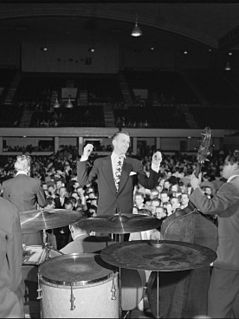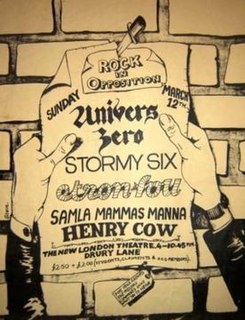
Progressive music is music that attempts to expand existing stylistic boundaries associated with specific genres of music. The word comes from the basic concept of "progress", which refers to advancements through accumulation, and is often deployed in the context of distinct genres, with progressive rock being the most notable example. Music that is deemed "progressive" usually synthesizes influences from various cultural domains, such as European art music, Celtic folk, West Indian, or African. It is rooted in the idea of a cultural alternative and may also be associated with auteur-stars and concept albums, considered traditional structures of the music industry.
Art rock is a subgenre of rock music that generally reflects a challenging or avant-garde approach to rock, or which makes use of modernist, experimental, or unconventional elements. Art rock aspires to elevate rock from entertainment to an artistic statement, opting for a more experimental and conceptual outlook on music. Influences may be drawn from genres such as experimental music, avant-garde music, classical music, and jazz.
Progressive rock is a broad genre of rock music that developed in the United Kingdom and United States throughout the mid-to late 1960s, peaking in the early 1970s. Initially termed "progressive pop", the style was an outgrowth of psychedelic bands who abandoned standard pop traditions in favour of instrumentation and compositional techniques more frequently associated with jazz, folk, or classical music. Additional elements contributed to its "progressive" label: lyrics were more poetic, technology was harnessed for new sounds, music approached the condition of "art", and the studio, rather than the stage, became the focus of musical activity, which often involved creating music for listening rather than dancing.
Progressive metal is a broad fusion music genre melding heavy metal and progressive rock, combining the loud "aggression" and amplified guitar-driven sound of the former with the more experimental, cerebral or "pseudo-classical" compositions of the latter.
Avant-garde music is music that is considered to be at the forefront of innovation in its field, with the term "avant-garde" implying a critique of existing aesthetic conventions, rejection of the status quo in favor of unique or original elements, and the idea of deliberately challenging or alienating audiences. Avant-garde music may be distinguished from experimental music by the way it adopts an extreme position within a certain tradition, whereas experimental music lies outside tradition.

Rock in Opposition or RIO was a movement representing a collective of progressive bands in the late 1970s united in their opposition to the music industry that refused to recognise their music. It was initiated by English avant-rock group Henry Cow in March 1978 when they invited four mainland European groups to come to London and perform in a festival called "Rock in Opposition".

Avant-garde metal is a subgenre of heavy metal music loosely defined by use of experimentation and innovative, avant-garde elements, including non-standard and unconventional sounds, instruments, song structures, playing styles, and vocal techniques. Avant-garde metal is influenced by progressive rock and extreme metal, particularly death metal, and is closely related to progressive metal. Some local scenes include Los Angeles, the San Francisco Bay Area, Boston, and Seattle in the United States, Oslo in Norway, and Tokyo in Japan.

TriPod is a rock trio with no guitars or keyboards.

The 5uu's were an American avant-rock group founded in Los Angeles, California in 1984 by drummer-composer Dave Kerman. The group released their first album in 1986 and recorded a second in 1988 with Motor Totemist Guild, a similar band from the area. The two groups merged in 1988 to form U Totem and made two albums. When U Totem split up in 1994, the 5uu's reformed and went on to make two more albums. In 2000 the band became known as Dave Kerman/5uu's and released a further two albums under this name. After a long pause, an album, ‘The Quiet In Their Bones’ was released in 2022.

David Kerman, better known as Dave Kerman, is an American experimental rock drummer and composer, best known as the founder and member of the Los Angeles avant-rock group 5uu's. He is also a member of the Belgian progressive rock band Present and the Israeli avant-rock band Ahvak. Kerman has been a member of the United States bands U Totem and Thinking Plague, and the Dutch band Blast. He has collaborated with several musicians, including Bob Drake, Chris Cutler and Fred Frith.

Etron Fou Leloublan, also known as EFL, were a French avant-garde rock band founded in 1973 by actor and saxophonist Chris Chanet. They recorded five studio albums between 1976 and 1985, and released a live album, En Public Aux Etats-Unis d'Amérique recorded during a tour of the United States in 1979. Etron Fou Leloublan were best known as one of the five original Rock in Opposition (RIO) bands that performed at the first RIO festival in London in March 1978.
The Muffins were an American Maryland-based progressive rock/avant-jazz group. They were formed in Washington, DC in the early 1970s and recorded four albums before disbanding in 1981. In 1998 the group reformed and recorded a further five albums and a DVD. The Muffins played at Symphony Space on Broadway in NYC with Marion Brown in 1979, and also performed at a number of festivals, starting with the ZU Manifestival in New York City in 1978, The Villa Celimontana festival in Rome, Italy in 2000, two appearances at Progday in 2001 and 2002, NEARfest in 2005, and the "Rock in Opposition" festival in France in 2009. In 2010, The Muffins headlined at Progday, making a third appearance at this long running festival.
The California Outside Music Association was a nonprofit music presenter and networking organization operating in the Los Angeles area from 1983 until 1991. The organization is best known for producing the album A Beginner’s Guide to COMA and a series of festivals called Day of Music. Founded by Titus Levi and Eric Potruch, COMA officially launched on March 3, 1983, when the two founders passed out a flyer describing COMA’s planned activities. This flyer came to be known as The COMA Manifesto. COMA's goals included bringing an eclectic scope of artists from diverse genres, for concerts and festivals. Genres included jazz, jazz rock, progressive rock, experimental 20th century compositions, ambient music music-concrete, free-jazz, post-rock improvisation, experimental rap, and multicultural/trans-cultural experiments.
Experimental rock, also called avant-rock, is a subgenre of rock music that pushes the boundaries of common composition and performance technique or which experiments with the basic elements of the genre. Artists aim to liberate and innovate, with some of the genre's distinguishing characteristics being improvisational performances, avant-garde influences, odd instrumentation, opaque lyrics, unorthodox structures and rhythms, and an underlying rejection of commercial aspirations.

Romantic Warriors II: A Progressive Music Saga About Rock in Opposition is a 2012 feature-length documentary film about the Rock in Opposition movement of the late 1970s, the music genre it spawned, and the influence it has on experimental groups across the world. The film was written and directed by Adele Schmidt and José Zegarra Holder, and was released in the United States by Zeitgeist Media. It premiered in Washington, D.C. on September 28, 2012. The film was generally well received by critics, with a reviewer at AllMusic saying that it "covers all the points an aficionado could possibly want".
Electronic rock is a music genre that involves a combination of rock music and electronic music, featuring instruments typically found within both genres. It originates from the late 1960s, when rock bands began incorporating electronic instrumentation into their music. Electronic rock acts usually fuse elements from other music styles, including punk rock, industrial rock, hip hop, techno, and synth-pop, which has helped spur subgenres such as indietronica, dance-punk, and electroclash.
Post-progressive is a type of rock music distinguished from vintage progressive rock styles, specifically 1970s prog. Post-progressive draws upon newer developments in popular music and the avant-garde since the mid-1970s. It especially draws from ethnic music and minimalism, elements which were new to rock music. It is different from neo-progressive rock in that the latter pastiches 1970s prog, while "post-progressive" identifies progressive rock music that stems from sources other than prog.
Proto-prog is the earliest work associated with the first wave of progressive rock music, known then as "progressive pop". Such musicians were influenced by modern classical and other genres usually outside of traditional rock influences. They often employed longer and more complicated compositions, interconnected songs as medley, and studio composition. Some of the artists that were essential to the development of progressive rock, rather than just anticipating the movement, include the Beatles, the Beach Boys, the Doors, the Pretty Things, the Zombies, the Byrds, the Grateful Dead and Pink Floyd.
Motor Totemist Guild is an American rock band, formed in 1980 in Orange County, California by band leader James Grigsby. Described as an avant-prog, avant-rock and chamber rock band, Motor Totemist Guild was noted for its songs that worked into epic durations and rich instrumentation but also forayed into free improvisation, sound collage, and other avant-garde techniques.
Kazma-Kazma (Казма-Казма) was a Soviet Ukrainian avant-garde musical group formed in Kharkiv in 1991 by Yevhen Khodosh. Considered the most prominent group of the Kharkiv independent scene in its day, alumni from this musical group became influential within Ukrainian music; flautist Dmytro Kurovskiy went on to found long running Ukrainian band Foa-Hoka while bassoonist Oleh Mykhailyuta became a member of TNMK. Kazma-Kazma was a major player in the Kharkiv music union "Novaya Scena"; the name "Novaya Scena" later became associated with the experimental underground music of Ukraine among western audiences.







